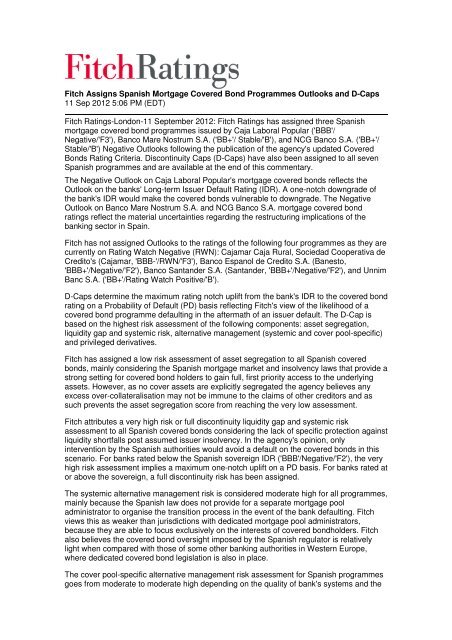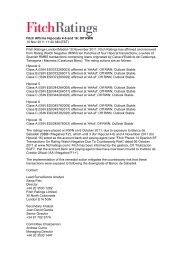Fitch Assigns Spanish Mortgage Covered Bond Programmes ...
Fitch Assigns Spanish Mortgage Covered Bond Programmes ...
Fitch Assigns Spanish Mortgage Covered Bond Programmes ...
- No tags were found...
You also want an ePaper? Increase the reach of your titles
YUMPU automatically turns print PDFs into web optimized ePapers that Google loves.
<strong>Fitch</strong> <strong>Assigns</strong> <strong>Spanish</strong> <strong>Mortgage</strong> <strong>Covered</strong> <strong>Bond</strong> <strong>Programmes</strong> Outlooks and D-Caps<br />
11 Sep 2012 5:06 PM (EDT)<br />
<strong>Fitch</strong> Ratings-London-11 September 2012: <strong>Fitch</strong> Ratings has assigned three <strong>Spanish</strong><br />
mortgage covered bond programmes issued by Caja Laboral Popular ('BBB'/<br />
Negative/'F3'), Banco Mare Nostrum S.A. ('BB+'/ Stable/'B'), and NCG Banco S.A. ('BB+'/<br />
Stable/'B') Negative Outlooks following the publication of the agency's updated <strong>Covered</strong><br />
<strong>Bond</strong>s Rating Criteria. Discontinuity Caps (D-Caps) have also been assigned to all seven<br />
<strong>Spanish</strong> programmes and are available at the end of this commentary.<br />
The Negative Outlook on Caja Laboral Popular's mortgage covered bonds reflects the<br />
Outlook on the banks' Long-term Issuer Default Rating (IDR). A one-notch downgrade of<br />
the bank's IDR would make the covered bonds vulnerable to downgrade. The Negative<br />
Outlook on Banco Mare Nostrum S.A. and NCG Banco S.A. mortgage covered bond<br />
ratings reflect the material uncertainties regarding the restructuring implications of the<br />
banking sector in Spain.<br />
<strong>Fitch</strong> has not assigned Outlooks to the ratings of the following four programmes as they are<br />
currently on Rating Watch Negative (RWN): Cajamar Caja Rural, Sociedad Cooperativa de<br />
Credito's (Cajamar, 'BBB-'/RWN/'F3'), Banco Espanol de Credito S.A. (Banesto,<br />
'BBB+'/Negative/'F2'), Banco Santander S.A. (Santander, 'BBB+'/Negative/'F2'), and Unnim<br />
Banc S.A. ('BB+'/Rating Watch Positive/'B').<br />
D-Caps determine the maximum rating notch uplift from the bank's IDR to the covered bond<br />
rating on a Probability of Default (PD) basis reflecting <strong>Fitch</strong>'s view of the likelihood of a<br />
covered bond programme defaulting in the aftermath of an issuer default. The D-Cap is<br />
based on the highest risk assessment of the following components: asset segregation,<br />
liquidity gap and systemic risk, alternative management (systemic and cover pool-specific)<br />
and privileged derivatives.<br />
<strong>Fitch</strong> has assigned a low risk assessment of asset segregation to all <strong>Spanish</strong> covered<br />
bonds, mainly considering the <strong>Spanish</strong> mortgage market and insolvency laws that provide a<br />
strong setting for covered bond holders to gain full, first priority access to the underlying<br />
assets. However, as no cover assets are explicitly segregated the agency believes any<br />
excess over-collateralisation may not be immune to the claims of other creditors and as<br />
such prevents the asset segregation score from reaching the very low assessment.<br />
<strong>Fitch</strong> attributes a very high risk or full discontinuity liquidity gap and systemic risk<br />
assessment to all <strong>Spanish</strong> covered bonds considering the lack of specific protection against<br />
liquidity shortfalls post assumed issuer insolvency. In the agency's opinion, only<br />
intervention by the <strong>Spanish</strong> authorities would avoid a default on the covered bonds in this<br />
scenario. For banks rated below the <strong>Spanish</strong> sovereign IDR ('BBB'/Negative/'F2'), the very<br />
high risk assessment implies a maximum one-notch uplift on a PD basis. For banks rated at<br />
or above the sovereign, a full discontinuity risk has been assigned.<br />
The systemic alternative management risk is considered moderate high for all programmes,<br />
mainly because the <strong>Spanish</strong> law does not provide for a separate mortgage pool<br />
administrator to organise the transition process in the event of the bank defaulting. <strong>Fitch</strong><br />
views this as weaker than jurisdictions with dedicated mortgage pool administrators,<br />
because they are able to focus exclusively on the interests of covered bondholders. <strong>Fitch</strong><br />
also believes the covered bond oversight imposed by the <strong>Spanish</strong> regulator is relatively<br />
light when compared with those of some other banking authorities in Western Europe,<br />
where dedicated covered bond legislation is also in place.<br />
The cover pool-specific alternative management risk assessment for <strong>Spanish</strong> programmes<br />
goes from moderate to moderate high depending on the quality of bank's systems and the
level of data provided and available to the analysis. The moderate high risk assessment on<br />
NCG Banco S.A. covered bond programme is driven by the uncertainties about the<br />
institution's long term business viability in light of the overall banking sector restructuring,<br />
and therefore it is considered to be under a wind down status.<br />
The risk assessment for privileged derivatives is considered as very low for all <strong>Spanish</strong><br />
programmes. <strong>Fitch</strong>-rated <strong>Spanish</strong> programmes do not have privileged derivative contracts<br />
linked to the mortgage book or to the covered bonds. The absence of any privileged<br />
hedging arrangements also means there is no potential termination payment to impact the<br />
liquidity risk or credit risk assessment.<br />
Cajamar's mortgage covered bond programme is on RWN reflecting the RWN on the<br />
banks' IDR, and therefore a one-notch downgrade of the bank's IDR would make the<br />
covered bonds vulnerable to downgrade. The ratings of Banesto, Banco Santander, and<br />
Unnim Banc S.A. mortgage covered bond programmes are on RWN because of data<br />
issues that will be discussed and assessed during the annual review of these programmes.<br />
The programmes' D-Caps and the risk assessments of the components are as follows:<br />
Caja Laboral Popular.<br />
<strong>Mortgage</strong> covered bond Rating: 'A-'/Negative<br />
D-Cap: 0 (full discontinuity risk)<br />
Asset segregation risk: low<br />
Liquidity gap and systemic risk: full discontinuity<br />
Systemic alternative management risk: moderate high<br />
Cover pool-specific alternative management risk: moderate<br />
Privileged derivatives risk: very low<br />
Banco Espanol de Credito S.A. (Banesto)<br />
<strong>Mortgage</strong> covered bond Rating: 'A'/RWN<br />
D-Cap: 0 (Full discontinuity risk)<br />
Asset segregation risk: low<br />
Liquidity gap and systemic risk: full discontinuity<br />
Systemic alternative management risk: moderate high<br />
Cover pool-specific alternative management risk: moderate high<br />
Privileged derivatives risk: very low<br />
Banco Santander, S.A.<br />
<strong>Mortgage</strong> covered bond Rating: 'A'/RWN<br />
D-Cap: 0 (full discontinuity risk)<br />
Asset segregation risk: low<br />
Liquidity gap and systemic risk: full discontinuity<br />
Systemic alternative management risk: moderate high<br />
Cover pool-specific alternative management risk: moderate high<br />
Privileged derivatives risk: very low<br />
The driver of the D-Cap for Caja Laboral Popular, Banesto and Santander is the full<br />
discontinuity risk assessment of liquidity gap and systemic risk. This is driven by the IDR of<br />
these banks being at or above the one of the sovereign.<br />
Banco Mare Nostrum S.A.<br />
<strong>Mortgage</strong> covered bond Rating: 'BBB+'/Negative<br />
D-Cap: 1 (very high risk)<br />
Asset segregation risk: low<br />
Liquidity gap and systemic risk: very high<br />
Systemic alternative management risk: moderate high<br />
Cover pool-specific alternative management risk: moderate<br />
Privileged derivatives risk: very low
NCG Banco, S.A.<br />
<strong>Mortgage</strong> covered bond Rating: 'BBB+'/Negative<br />
D-Cap: 1 (very high risk)<br />
Asset segregation risk: low<br />
Liquidity gap and systemic risk: very high<br />
Systemic alternative management risk: moderate high<br />
Cover pool-specific alternative management risk: moderate high<br />
Privileged derivatives risk: very low<br />
Cajamar Caja Rural, Sociedad Cooperativa de Credito (Cajamar)<br />
<strong>Mortgage</strong> covered bond Rating: 'A-'/RWN<br />
D-Cap: 1 (very high risk)<br />
Asset segregation risk: low<br />
Liquidity gap and systemic risk: very high<br />
Systemic alternative management risk: moderate high<br />
Cover pool-specific alternative management risk: moderate<br />
Privileged derivatives risk: very low<br />
Unnim, Banc, S.A.<br />
<strong>Mortgage</strong> covered bond Rating: 'BBB+'/RWN<br />
D-Cap: 1 (very high risk)<br />
Asset segregation risk: low risk<br />
Liquidity gap and systemic risk: very high<br />
Systemic alternative management risk: moderate high<br />
Cover pool-specific alternative management risk: moderate high<br />
Privileged derivatives risk: very low<br />
For all of <strong>Fitch</strong>'s Eurozone Crisis commentary go to<br />
http://www.fitchratings.com/web_content/pages/grs/eurozone<br />
Contact:<br />
Primary Analyst (Banco Santander, S.A.)<br />
Juan David Garcia<br />
Senior Director<br />
+34 91 702 57 74<br />
General Castanos 11<br />
28004 Madrid<br />
Spain<br />
Primary Analyst (Banco Espanol de Credito, S.A.)<br />
Federica Fabrizi<br />
Director<br />
+39 02 87 90 87 232<br />
<strong>Fitch</strong> Italia S.p.A.<br />
1, Vicolo S. Maria alla Porta<br />
20123 Milan<br />
Primary Analyst (Banco Mare Nostrum S.A.)<br />
Solena Gloaguen<br />
Director<br />
+44 20 3530 1126<br />
<strong>Fitch</strong> Ratings Limited<br />
30 North Colonnade<br />
London E14 5GN<br />
Primary Analyst (Cajamar, Unnim Banc S.A., NCG Banco, S.A.)<br />
Covadonga Aybar<br />
Analyst<br />
+34 91 702 57 75<br />
<strong>Fitch</strong> Ratings Spain - Madrid
Calle General Castanos 11, 1st Floor<br />
Madrid<br />
Primary Analyst (Caja Laboral Popular)<br />
Natasha Ahmed<br />
Associate Director<br />
+ 44 203 530 1301<br />
<strong>Fitch</strong> Ratings Limited<br />
30 North Colonnade<br />
London E14 5GN<br />
Secondary Analyst (Banco Mare Nostrum S.A., NCG Banco S.A.)<br />
Carlos Masip<br />
Director<br />
+34 91 702 57 73<br />
General Castanos 11<br />
28004 Madrid<br />
Spain<br />
Secondary Analyst (Banco Santander, Banesto, Unnim Banc S.A., Cajamar)<br />
Natasha Ahmed<br />
Associate Director<br />
+ 44 203 530 1301<br />
Secondary Analyst (Caja Laboral Popular)<br />
Solena Gloaguen<br />
Director<br />
+44 20 3530 1126<br />
Media Relations: Christian Giesen, Frankfurt am Main, Tel: +49 69 768076 232, Email:<br />
christian.giesen@fitchratings.com.<br />
Additional information is available at www.fitchratings.com.<br />
Santander and Banesto's <strong>Covered</strong> <strong>Bond</strong> ratings were unsolicited and have been provided<br />
by <strong>Fitch</strong> as a service to investors.<br />
All other covered bond ratings were solicited by, or on behalf of, the issuer, and therefore,<br />
<strong>Fitch</strong> has been compensated for the provision of the ratings.<br />
Applicable criteria, '<strong>Covered</strong> <strong>Bond</strong>s Rating Criteria', dated 10 September 2012, '<strong>Covered</strong><br />
<strong>Bond</strong>s Counterparty Criteria', dated 13 March 2012, 'EMEA Residential <strong>Mortgage</strong> Loss<br />
Criteria' dated 7 June 2012, 'EMEA Criteria Addendum - Spain - <strong>Mortgage</strong> Loss and Cash<br />
Flow Assumptions', dated 24 July 2012, 'Criteria for Rating Granular Corporate Balance-<br />
Sheet Securitisations (SME CLOs)' dated 1 June 2012 are available on<br />
www.fitchratings.com.<br />
Applicable Criteria and Related Research:<br />
<strong>Covered</strong> <strong>Bond</strong>s Rating Criteria<br />
<strong>Covered</strong> <strong>Bond</strong>s Counterparty Criteria<br />
EMEA Residential <strong>Mortgage</strong> Loss Criteria<br />
EMEA Criteria Addendum - Spain - <strong>Mortgage</strong> and Cashflow Assumptions<br />
Criteria for Rating Granular Corporate Balance-Sheet Securitisations - SME CLO<br />
ALL FITCH CREDIT RATINGS ARE SUBJECT TO CERTAIN LIMITATIONS AND<br />
DISCLAIMERS. PLEASE READ THESE LIMITATIONS AND DISCLAIMERS BY<br />
FOLLOWING THIS LINK:<br />
HTTP://FITCHRATINGS.COM/UNDERSTANDINGCREDITRATINGS. IN ADDITION,<br />
RATING DEFINITIONS AND THE TERMS OF USE OF SUCH RATINGS ARE AVAILABLE<br />
ON THE AGENCY'S PUBLIC WEBSITE 'WWW.FITCHRATINGS.COM'. PUBLISHED
RATINGS, CRITERIA AND METHODOLOGIES ARE AVAILABLE FROM THIS SITE AT<br />
ALL TIMES. FITCH'S CODE OF CONDUCT, CONFIDENTIALITY, CONFLICTS OF<br />
INTEREST, AFFILIATE FIREWALL, COMPLIANCE AND OTHER RELEVANT POLICIES<br />
AND PROCEDURES ARE ALSO AVAILABLE FROM THE 'CODE OF CONDUCT'<br />
SECTION OF THIS SITE.




